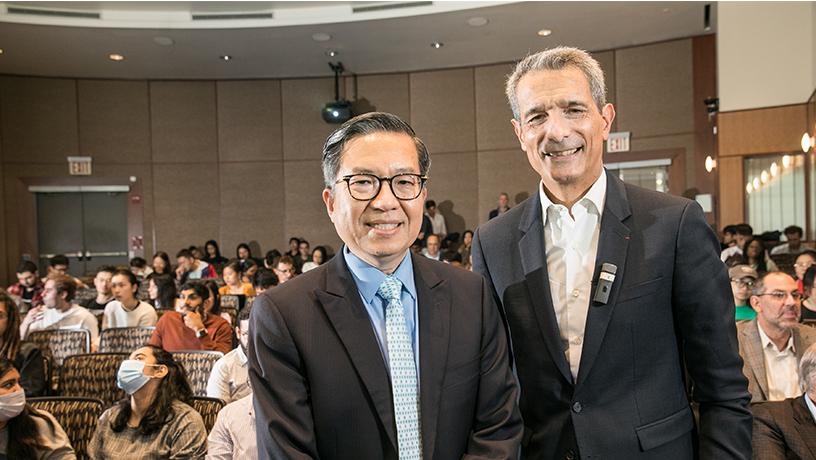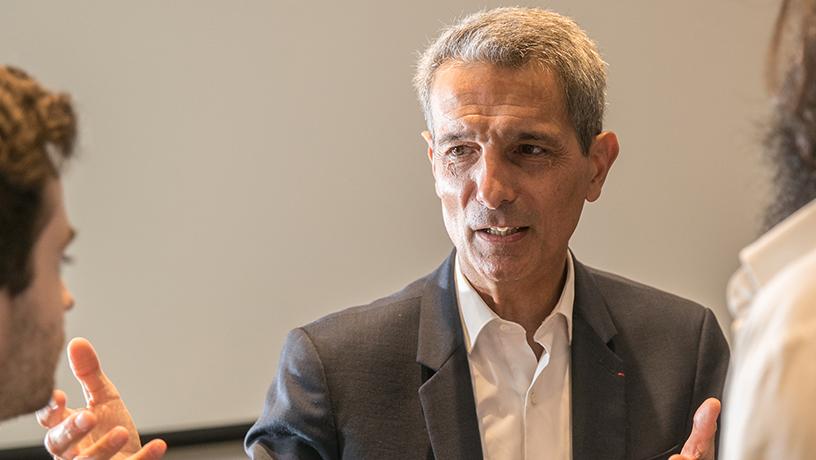Tech Talk with Saint-Gobain CEO on Sustainable Construction
Benoit Bazin, the chief executive officer at Saint-Gobain, delivered the inaugural lecture at Columbia Engineering's Tech CEO series.

Columbia Engineering Dean Shih-Fu Chang (left) with Saint-Gobain CEO Benoit Bazin. Bazin delivered the inaugural lecture for the School’s new Tech Ceo Lecture Series. (Credit: Timothy Lee)
On September 18, Columbia Engineering held its inaugural Tech CEO Lecture Series with guest Benoit Bazin, the CEO of Saint-Gobain, a giant in the field of light and sustainable construction. The new series is designed to immerse students in the epicenter of technological innovation.
The idea for starting the Tech CEO series is to bring leaders and deep thinkers in the industry to our campus. These are the individuals who bring technology innovation to the practice, to the market, and to solve global challenges, ” said Columbia Engineering Dean Shih-Fu Chang at the event, which took place at Davis Auditorium on Columbia’s Morningside campus. The aim is to have industry leaders visit classrooms to share their experience, expertise, vision and also their aspirations with the students, as well as the faculty.
Bazin’s talk, titled “Can Buildings Help Fight Climate Change? – Leveraging Engineering Technology to Fight Climate Change,” which coincided with Climate Week NYC, centered on energy, sustainable infrastructure, and the pressing environmental challenges facing the construction sector.
Bazin, who joined Saint-Gobain in 1999, was named CEO in 2021. He served as chief operating officer of Saint-Gobain prior to his CEO appointment and was also elected to the board. Bazin started his lecture with a brief video of Saint-Gobain, one of the oldest companies in the world, first established as a mirror manufacturer in 1665. It has grown into a global leader in light and sustainable construction with 168,000 employees in 75 countries.
On the path to reach carbon neutrality by 2050
Bazin discussed the nuances of sustainable building infrastructure. Recognizing the construction industry's significant carbon footprint, he emphasized the urgency for sustainable practices in urban development. The company is now tackling three main challenges–reducing CO2 emissions, preserving natural resources, and addressing the construction needs of a growing global population.

Bazin talks with students after the lecture and also attends a post-event networking session. The new Tech CEO Lecture Series gives students access to executive leaders at the most innovative technology companies. (Credit: Timothy Lee)
Saint-Gobain launched a new series of low carbon products, including a low carbon glass. They’ve also examined how construction materials can impact areas like education, noting how the acoustics of a classroom can have an effect on teaching. As a testament to Saint-Gobain's commitment to sustainability, Bazin highlighted their aspirational goal of reaching carbon neutrality by 2050. They've made key advancements, such as running hydrogen in a glass furnace, a process previously thought to be too complex.
The Tech CEO lecture was followed by questions with the audience where students got an opportunity to interact with Bazin and other Saint-Gobain executive leaders. They discussed leadership, innovation, and the risks tied to operating a business, and they offered insights into recent industry advancements and emerging strategies. Additionally, the team highlighted Saint-Gobain's new job openings and their internship opportunities for students, both in the U.S. and globally.
Bazin, having been an engineer in his earlier days, was deeply enthusiastic about engaging with the next generation of the engineering industry. "We truly have the power to make our impact in the world," he said. “And we [look to] you to put your brain, power, and energy to action, particularly in manufacturing.”
